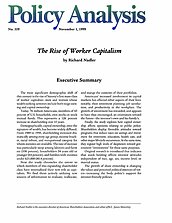The most significant demographic shift of this century is the rise of history’s first mass class of worker capitalists–men and women whose wealth-seeking activities include both wage earning and capital ownership.
Today, 76 million Americans, members of 43 percent of U.S. households, own stocks or stock mutual funds. This represents a 126 percent increase in shareholding over 15 years.
Demographically, capital ownership, once the signature of wealth, has become widely diffused. From 1989 to 1995, shareholding increased dramatically among every age group, income bracket, racial cohort, and occupational category for whom statistics are available. The rate of increase was particularly steep among laborers and farmers (106 percent), householders 34 years old or younger (64 percent), and families with incomes under $25,000 (80.4 percent).
Next the study chronicles the extent to which members of this expanding shareholder class have internalized their new role as capitalists. We find them actively utilizing new sources of information to evaluate, reallocate, and mange the contents of their portfolios.
Americans’ increased involvement in capital markets has affected other aspects of their lives: notably, their retirement planning, job satisfaction, and productivity in the workplace. The growth of investment has rewarded, and appears to have thus encouraged, an orientation toward the future–the investor’s own and his family’s.
Finally, the study explores how capital ownership affects opinions relating to public policy. Shareholders display favorable attitudes toward programs that reduce taxes on savings and investment for retirement, education, health care, and other major life-cycle occurrences. At the same time, they register high levels of skepticism toward government “investments” for these same purposes.
Original research is introduced that indicates that stock holding affects investor attitudes independent of race, age, sex, income level, or marital status.
The growth of share ownership is changing the values and perceived political interests of voters–increasing the body politic’s support for investor-friendly policies.
About the Author

This work is licensed under a Creative Commons Attribution-NonCommercial-ShareAlike 4.0 International License.
